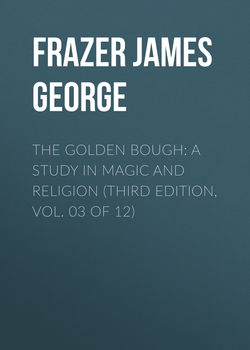The Golden Bough: A Study in Magic and Religion (Third Edition, Vol. 03 of 12)

Реклама. ООО «ЛитРес», ИНН: 7719571260.
Оглавление
Frazer James George. The Golden Bough: A Study in Magic and Religion (Third Edition, Vol. 03 of 12)
Preface
Chapter I. The Burden Of Royalty
§ 1. Royal and Priestly Taboos
§ 2. Divorce of the Spiritual from the Temporal Power
Chapter II. The Perils Of The Soul
§ 1. The Soul as a Mannikin
§ 2. Absence and Recall of the Soul
§ 3. The Soul as a Shadow and a Reflection
Chapter III. Tabooed Acts
§ 1. Taboos on Intercourse with Strangers
§ 2. Taboos on Eating and Drinking
§ 3. Taboos on shewing the Face
§ 4. Taboos on quitting the House
§ 5. Taboos on leaving Food over
Chapter IV. Tabooed Persons
§ 1. Chiefs and Kings tabooed
§ 2. Mourners tabooed
§ 3. Women tabooed at Menstruation and Childbirth
§ 4. Warriors tabooed
§ 5. Manslayers tabooed
§ 6. Hunters and Fishers tabooed
Chapter V. Tabooed Things
§ 1. The Meaning of Taboo
§ 2. Iron tabooed
§ 3. Sharp Weapons tabooed
§ 4. Blood tabooed
§ 5. The Head tabooed
§ 6. Hair tabooed
§ 7. Ceremonies at Hair-cutting
§ 8. Disposal of Cut Hair and Nails
§ 9. Spittle tabooed
§ 10. Foods tabooed
§ 11. Knots and Rings tabooed
Chapter VI. Tabooed Words
§ 1. Personal Names tabooed
§ 2. Names of Relations tabooed
§ 3. Names of the Dead tabooed
§ 4. Names of Kings and other Sacred Persons tabooed
§ 5. Names of Gods tabooed
§ 6. Common Words tabooed
Chapter VII. Our Debt To The Savage
Note. Not To Step Over Persons And Things.1552
Отрывок из книги
At a certain stage of early society the king or priest is often thought to be endowed with supernatural powers or to be an incarnation of a deity, and consistently with this belief the course of nature is supposed to be more or less under his control, and he is held responsible for bad weather, failure of the crops, and similar calamities.1 To some extent it appears to be assumed that the king's power over nature, like that over his subjects and slaves, is exerted through definite acts of will; and therefore if drought, famine, pestilence, or storms arise, the people attribute the misfortune to the negligence or guilt of their king, and punish him accordingly with stripes and bonds, or, if he remains obdurate, with deposition and death.2 Sometimes, however, the course of nature, while regarded as dependent on the king, is supposed to be partly independent of his will. His person is considered, if we may express it so, as the dynamical centre of the universe, from which lines of force radiate to all quarters of the heaven; so that any motion of his – the turning of his head, the lifting of his hand – instantaneously affects and may seriously disturb some part of nature. He is the point of support on which hangs the balance of the world, and the slightest irregularity on his part may overthrow the delicate equipoise. The greatest care must, therefore, be taken both by and of him; and his whole life, down to its minutest details, must be so regulated that no act of his, voluntary or involuntary, may disarrange or upset the established order of nature. Of this class of monarchs the Mikado or Dairi, the spiritual emperor of Japan, is or rather used to be a typical example. He is an incarnation of the sun goddess, the deity who rules the universe, gods and men included; once a year all the gods wait upon him and spend a month at his court. During that month, the name of which means “without gods,” no one frequents the temples, for they are believed to be deserted.3 The Mikado receives from his people and assumes in his official proclamations and decrees the title of “manifest or incarnate deity” (Akitsu Kami) and he claims a general authority over the gods of Japan.4 For example, in an official decree of the year 646 the emperor is described as “the incarnate god who governs the universe.”5
The following description of the Mikado's mode of life was written about two hundred years ago: —6
.....
Lost souls extracted from a fowl.
The Battas or Bataks of Sumatra believe that the soul of a living man may transmigrate into the body of an animal. Hence, for example, the doctor is sometimes desired to extract the patient's soul from the body of a fowl, in which it has been hidden away by an evil spirit.211
.....